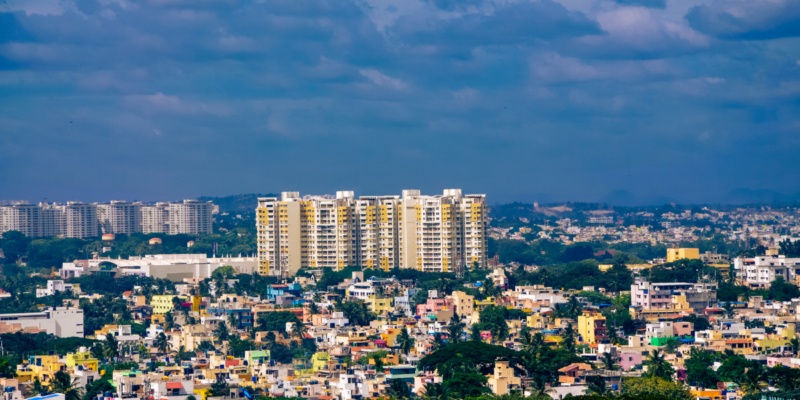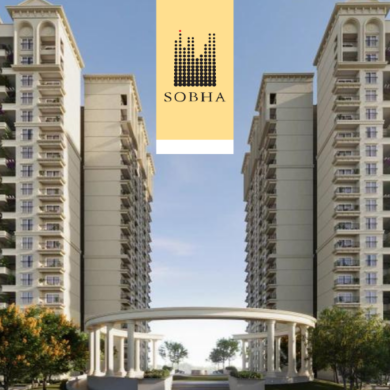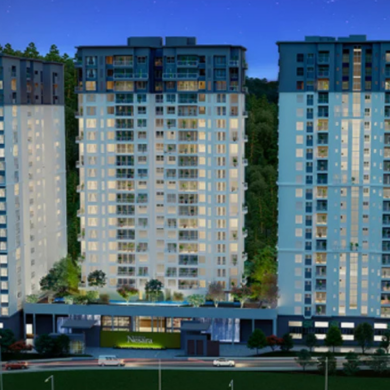Cost of Living in Bangalore (2024): Guide for Families, Students, Bachelors
July 31st, 2024

Explore the cost of living in Bangalore for 2024 – with detailed insights for families, students, bachelors, and couples. By covering housing, transport, groceries, and many other cost centres, this blog will help you plan a comfortable life in Bangalore.
Understanding the 2024 cost of living in Bangalore is crucial for anyone planning to move to this vibrant city. Whether you are a student, bachelor, couple, or family, knowing these expenses will help you budget effectively.
This blog gives detailed insights into the cost of living in Bangalore (2024), including housing, transport, groceries, and other essential expenses. With costs tailored to diverse demographics, you will find practical tips and recommendations to manage your finances and enjoy a comfortable lifestyle in the Silicon Valley of India.
Table of Contents
Understanding Bangalore’s Cost of Living
To comprehend the cost of living in Bangalore, you can consider various factors such as housing, transport, groceries, and lifestyle choices. As one of India’s major metropolitan cities, Bangalore offers a range of living standards, from luxurious to budget-friendly. Bangalore rent prices vary significantly based on location, with central areas being more expensive.
Public transport in Bangalore is cost-effective, making commuting affordable for many. Additionally, the cost of groceries in Bangalore and other daily necessities can differ based on your preferences and shopping habits. Understanding these elements is key to planning your budget effectively and ensuring a comfortable living experience in the city.
Cost of Living in Bangalore 2024 – Breakdown for Different Demographics
Understanding the cost of living in Bangalore is essential for anyone planning to move to this dynamic city. As a major metropolitan area, Bangalore offers a range of living standards and expenses that vary significantly based on individual circumstances and lifestyle choices.
Whether you are a student, bachelor, couple, or family, having a clear picture of the various costs involved can help you plan your budget more effectively. This breakdown provides insights into housing, utilities, food, transport, healthcare, and other essential expenses tailored to different demographics – enabling you to take informed financial decisions.
Students
For students, navigating the cost of living in Bangalore can be manageable with a bit of planning. Balancing accommodation, food, transport, and other essential expenses is crucial for maintaining a budget while focusing on studies. Understanding the specifics of these costs will help students take informed decisions and enjoy their time in this vibrant city.
- Housing Costs: For students, student accommodation in Bangalore includes options such as hostels, PGs (Paying Guests), and shared apartments. The monthly rent ranges from ₹5000 to ₹15,000, depending on the location and facilities provided. Areas near major educational institutions might be slightly pricier, but offer convenience and reduced travel time.
- Utility Costs: These are generally low, especially in hostels and PGs, where some utilities are included in the rent. Students might spend around ₹1000 to ₹2000 per month on electricity, water, and internet.
- Food and Groceries: Students often rely on mess facilities or local eateries. Monthly food expenses can range from ₹3000 to ₹6000. Those who prefer cooking can manage with a grocery budget of around ₹2000 to ₹3000 per month.
- Transport Costs: Public transport in Bangalore is a cost-effective option for students. Monthly expenses for buses, metros, and autos typically range from ₹1000 to ₹2000 per month, depending on the distance and frequency of travel.
- Healthcare Expenses: Students usually have minimal healthcare expenses, averaging around ₹500 to ₹1000 per month for basic medical needs (assuming health insurance is already taken by parents).
- Entertainment and Leisure: These activities might cost students around ₹1000 to ₹2000 per month – covering movies, dining out, and socialising.
- Miscellaneous Expenses: These include study materials, personal care, and other necessities, and can amount to ₹1000 – ₹2000 monthly.
Bachelors
Bachelors in the city often seek a balance between cost and convenience. Understanding Bangalore rent prices, utility costs, and other living expenses can help bachelors optimise their budget.
- Housing Costs: Bachelors often opt for shared apartments or PG accommodations. Affordable areas in Bangalore for bachelors – like Electronic City, BTM Layout, and Hebbal – offer rents ranging from ₹8000 to ₹20,000 per month, depending on the amenities and location.
Check out – Top 20 Residential Areas to Live in Bangalore - Utility Costs: Utilities for bachelors, including electricity, water, and internet, can cost between ₹2000 to ₹4000 monthly, shared among flatmates if in a shared apartment.
- Food and Groceries: Bachelors may spend around ₹4000 to ₹8000 on monthly food and groceries. Eating out frequently might increase this cost, whereas cooking at home can be more economical.
- Transport Costs: By using shared rides or public transport, bachelors can expect to spend ₹1500 to ₹3000 monthly on commuting.
- Healthcare Expenses: These generally range from ₹1000 to ₹2000 per month, covering basic medical needs and insurance.
- Entertainment and Leisure: Social activities, dining out, and other leisure activities might cost bachelors around ₹2000 to ₹4000 per month.
- Miscellaneous Expenses: Personal expenses, clothing, and other miscellaneous costs can add up to ₹2000 to ₹4000 monthly for bachelors.
Couples
Couples residing in Bangalore need to consider various factors while planning their budget. From housing to healthcare, understanding the cost of living in Bangalore can help them create a balanced and comfortable lifestyle.
- Housing Costs: The cost of living in Bangalore for couples often involves renting a 1 or 2-bedroom apartment. Monthly rent for such accommodations can range from ₹15,000 to ₹30,000 – with areas such as Indiranagar, HSR Layout, Marathahalli, and Koramangala being popular choices.
- Utility Costs: Utilities for couples, including electricity, water, internet, and gas, generally cost between ₹3000 to ₹5000 monthly.
- Food and Groceries: Every month, couples may spend around ₹6000 to ₹12,000 on these, depending on dining habits and whether they prefer home-cooked meals.
- Transport Costs: Depending on their commuting needs, couples might spend ₹2000 to ₹4000 monthly on public transport or carpooling. Owning a vehicle will definitely push up the costs due to down payment, EMIs, regular maintenance, and fuel costs.
- Healthcare Expenses: Healthcare expenses for couples can range from ₹2000 to ₹4000 per month, including health insurance and medical bills. This can suddenly go up, in case insurance is not taken, or is insufficient.
- Entertainment and Leisure: Monthly expenses under these head can cost ₹3000 – ₹5000, and may include dining out, movies, and other activities.
- Miscellaneous Expenses: Personal care, shopping, and other miscellaneous expenses typically add up to ₹3000 to ₹5000 per month for couples.
Families
Families planning to settle in Bangalore need to account for multiple expenses, to ensure a comfortable lifestyle. Understanding family living expenses in Bangalore is essential for effective budgeting, from housing to education.
- Housing Costs: Family living expenses in Bangalore include renting a 2BHK or 3BHK apartment, with monthly rents ranging between ₹25,000 to ₹50,000 – depending on the locality. Popular family-friendly neighbourhoods in Bangalore are Whitefield, Sarjapur Road, and Jayanagar.
Read More: Safest Areas in Bangalore to Live with Family – SOBHA Ltd. - Utility Costs: Electricity, water, internet, gas, and DTH / cable can amount to ₹5000 to ₹8000 monthly.
- Food and Groceries: Depending on family size and dietary preferences, these may cost ₹10,000 to ₹20,000 per month.
- Transport Costs: Whether owning a vehicle or using cabs, families can expect to spend ₹4000 to ₹8000 monthly on commuting and transport costs.
- Healthcare Expenses: These include health insurance and regular medical check-ups, and can range from ₹4000 to ₹8000 per month.
- Education and Childcare: For families with children, education and childcare costs are significant. School fees, extracurricular activities, and childcare can range from ₹10,000 to ₹30,000 monthly, depending on the institution and services chosen.
- Entertainment and Leisure: Family outings, movies, dining out, and recreational activities can cost families between ₹5000 to ₹10,000 per month.
- Miscellaneous Expenses: For families, miscellaneous expenses such as clothing, personal care, household items, and other necessities can add up to ₹5000 to ₹10,000 monthly.
10 Additional Considerations – Cost of Living in Bangalore
When planning for the cost of living in Bangalore, many additional factors must be considered in addition to the basic expenses of housing, food, and transport.
-
Insurance
Adequate insurance coverage is crucial for mitigating unexpected expenses. Health insurance is particularly important, and it is advisable to compare different plans to find one that offers comprehensive coverage at an affordable premium. Vehicle insurance is also a mandatory expense for those who own vehicles.
-
Savings and Investments
Allocating a portion of your monthly budget to savings and investments is essential. This not only helps build a financial cushion for emergencies, but also aids in achieving long-term financial goals.
-
Lifestyle Choices
Your lifestyle choices can greatly influence living expenses. Dining out frequently, indulging in luxury purchases, and opting for premium services will increase your monthly expenditure. On the other hand, adopting a more practical lifestyle by cooking frequently at home, using public transport, and seeking budget-friendly entertainment options can help save money in Bangalore.
-
Cost of Living Comparison
If you are relocating from another city, compare the costs of living in Bangalore vs. other cities – to understand how much your expenses could differ from your current situation. This can help you set realistic expectations and plan the monthly budget.
-
Seasonal Variations
Bangalore’s weather is relatively moderate, but utility costs may vary with the seasons. For instance, electricity bills might be higher during the summer months due to increased usage of fans and ACs. Being mindful of these variations can help you budget better.
-
Local Taxes
Be aware of the local taxes applicable in Bangalore, such as property tax, road tax, and service tax on various services.
-
Emergency Fund
Maintaining this is vital for covering unforeseen expenses such as medical emergencies, sudden repairs, or job loss. Aim to save living expenses of around 3-6 months in an easily accessible account.
-
Connectivity and Commute
While public transport is a cost-effective way to travel, consider the time and convenience of your daily commute. Proximity to the workplace or educational institution can save time and money, making areas with good connectivity more desirable despite potentially higher rent prices.
-
Cultural and Social Activities
Engaging in Bangalore’s rich cultural and social scene can enhance your living experience but add to your expenses. Budget for occasional outings, events, and social gatherings to avoid overspending.
-
Inflation
Lastly, it is important to account for inflation, which can affect the cost of groceries in Bangalore, rent, and other living expenses. Regularly adjust your budget to accommodate rising costs and maintain financial stability.
Conclusion
Understanding the cost of living in Bangalore is essential for effective financial planning of students, bachelors, couples, and families. By breaking down various expenses, you can create a budget that suits you and ensures a comfortable living experience in this dynamic city. From housing and utilities to transport and healthcare, each demographic faces unique costs that need careful consideration.
Residents of Bangalore are increasingly opting to buy luxury homes instead of staying on rent. With the availability of modern amenities and prime locations, investing in a flat or apartment can be more cost-effective in the long run. Instead of spending on rent, you can pay EMIs to own a luxurious home, offering stability and comfort to your family.
For those seeking high-quality living spaces, SOBHA provides an excellent opportunity to buy a flat or apartment in Bangalore. To discover the perfect blend of luxury and convenience, visit SOBHA Flats for Sale in Bangalore or call 08046464500.
FAQs
1. Is Bangalore expensive for students?
No, Bangalore is not expensive for students; the city can be affordable with proper budgeting – especially if students choose hostels or PG accommodations, use public transport, create a realistic budget, and spend judiciously.
2. Affordable places to stay in Bangalore for bachelors?
Affordable places to stay in Bangalore for bachelors are areas such as BTM Layout, Whitefield, and some parts of Koramangala.
3. Cost of living in Bangalore for couples compared to other cities?
Cost of living in Bangalore for couples compared to other cities like Mumbai and Delhi is moderate, with affordable housing and public transport options.
4. Best areas for families in Bangalore (considering affordability)?
Best areas for families in Bangalore (considering affordability) are Whitefield, Sarjapur Road, and Jayanagar.
5. Average monthly grocery budget for a single person in Bangalore?
Average monthly grocery budget for a single person in Bangalore is ₹3000 to ₹6000.
6. Public transport options in Bangalore and their affordability?
Public transport options in Bangalore are BMTC AC & non-AC buses, metros, autos, cabs, bike taxis, and ridesharing cars – most of these are affordable with monthly costs ranging from ₹1000 to ₹2000.
7. Hidden costs of living in Bangalore besides rent?
Hidden costs of living in Bangalore besides rent are utilities, transport, healthcare, and entertainment expenses.
8. Financial planning tips for moving to Bangalore for a job?
Financial planning tips for moving to Bangalore for a job are creating a realistic budget, sharing accommodation, using public transport, and allocating savings for unexpected expenses.
9. Is it cheaper to cook at home or eat out in Bangalore?
It is cheaper to cook at home than eat out in Bangalore.
10. What is the average cost of renting an apartment in Bangalore for families?
The average cost of renting an apartment in Bangalore for families is ₹25,000 to ₹50,000 per month for a 2BHK or 3BHK.
11. How much does it cost for students to live in a shared apartment or hostel in Bangalore?
It costs ₹5000 to ₹15,000 per month for students to live in a shared apartment or hostel in Bangalore.
12. What are the average monthly utility costs in Bangalore?
The average monthly utility costs in Bangalore are ₹3000 to ₹5000 for electricity, water, internet, and gas.
13. How much should families budget for groceries and dining out in Bangalore?
Families should budget ₹10,000 to ₹20,000 per month for groceries and dining out in Bangalore.
14. What are the common transportation options and their costs in Bangalore?
Common transportation options in Bangalore are buses, metros, autos, cabs, bike taxis, and ridesharing cars – with monthly costs typically ranging from ₹1000 to ₹3000.
15. How much does health insurance cost for families in Bangalore?
Health insurance costs ₹4000 to ₹8000 per month for families in Bangalore, depending on the coverage.
16. What is the cost of education and childcare for families in Bangalore?
The cost of education and childcare for families in Bangalore is ₹10,000 to ₹30,000 per month per child, depending on the institution and services.
17. What are the popular leisure activities and their costs for families in Bangalore?
Popular leisure activities for families in Bangalore are family outings, movies, and recreational activities, and they can cost between ₹5000 to ₹10,000 per month.
18. How do students typically spend on entertainment in Bangalore?
Students typically spend ₹1000 to ₹2000 per month on entertainment in Bangalore, with options such as movies and socialising.
19. What are the miscellaneous expenses one should consider while living in Bangalore?
Miscellaneous expenses one should consider while living in Bangalore are personal care, clothing, household items, and occasional repairs, which range from ₹3000 to ₹5000 per month.
20. Is Bangalore an expensive city to live in compared to other major cities in India?
Bangalore is a moderately expensive city to live in compared to other major cities in India, with higher costs for rent & groceries but affordable public transport and utilities.









